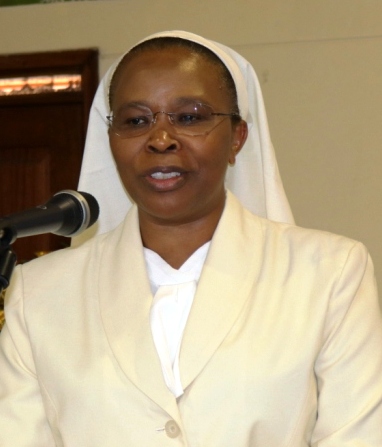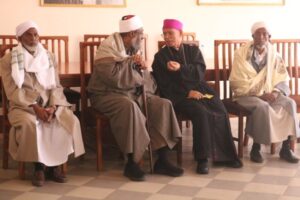UGANDA: Hilton Foundation Ccatholic Sisters Initiative Unveils Strategy 2018-2022 to East AFRICA

Sr Jane Wakahiu LSOF, Director of the Catholic Sisters Initiative at Conrad N. Hilton Foundation
The Conrad Hilton Foundation Catholic Sisters Initiative has outlined their strategy for 2018–2022 at the East Africa Convening which has taken place at Speke Resort and Conference Centre in Munyonyo – Kampala in Uganda place from 6th to 8th November 2018. The new strategy aims at building on the progress so far made in their philanthropic agenda under phase 1, implemented between 2013 and 2017.
Increasing the financial and human resources capacity to sustain Catholic Sisters and their services through Sisters’ education; strengthening the services provided by the Catholic Sisters to the vulnerable people especially the youth and young adults aged 15-25; collecting, using and disseminating research and program data to improve the practices and policies of Catholic Sisters’ Congregations, conferences and partners, and to increase external knowledge; creating sustainable solutions (innovativeness) to challenges to the vitality of Sisters’ ministries and organizations – these are the intersecting portfolios’ objectives in the 2018-2022 strategy.
HILTON FOUNDATION: Catholic Sisters Initiative and Theory of Change
Addressing the participants from various East Africa countries such as Kenya, Malawi, Zambia South Sudan and Uganda, and others from beyond AMECEA region such as Lesotho and United States, Director of the Catholic Sisters Initiative at Conrad N. Hilton Foundation, Sr Jane Wakahiu LSOF described their experience of partnership and collaboration during the first phase as “so far positive.”
“It takes a village to raise a child. And if you can’t feed a hundred people, at least feed one, goes the philanthropic approach of the Foundation which Conrad Hilton founded to relieve the suffering of the destitute in society. The philosophy of the Foundation is partnership and collaboration whereby the Hilton Foundation fundraises and the Catholic nuns are the implementing partners,” said Sr Jane, who added that in this second phase, the vision is to strengthen partnership with men and women and other institutions so that Catholic nuns are strengthened, arguing that together, they will create a greater impact in society.
The Strategy, which is built on ‘Theory of Change’, is guided by the Foundation’s Vision 2030: its aim is to create partnerships and collaboration that will enable the Catholic Sisters to be recognized as global leaders in provision of sustainable human development services, while remaining grounded in the vitality of the Congregations’ charism.
In social and community development studies, the Theory of Change is essentially about an organization comprehensively describing why and how change must happen in a particular context. It implies identifying what is missing both internally (in Sisters’ Congregations) and externally (in society) and then coming up with change initiatives that will lead them into achieving the desired goals.
In the Strategy 2018-2022, the Hilton Conrad Foundation recognizes that “Catholic Sisters are serving in the most difficult and dangerous places to address social and economic inequalities facing the people of different religious backgrounds.” It is the aim of the Foundation to increase the capacity of the Catholic nuns in East Africa; to meaningfully address poverty; to elevate their recognition as moral and spiritual leaders; and a voice in the global efforts to relive human suffering.
And according to the Foundation, the 2013-2017 strategy has achieved a number of successes such as the significant increase in the number of nuns who now have post-secondary education credentials and are now capable to do and expand their ministries and to take up leadership roles. This is going a step further than the 2013-2017 Strategy of the Hilton Foundation Sisters Initiative, which focused on building the internal capacities of the Sisters’ Congregations, especially improving the membership, leadership and outcomes of the financial resources.
In the new strategy, the Conrad N. Hilton Foundation prioritizes care for the youth and the homeless; access to clean and safe water; prevention of substance abuse; and improving early childhood especially for the children affected by HIV and Aids.
Why Catholic nuns?
The Foundation has for the past 74 years prioritized supporting Catholic nuns not only because the founder was taught Catechism by the Loreto Sisters but rather as a recognition of the fact that more than 700,000 Catholic nuns all over the world are involved in educating the youth and children, care of the vulnerable and oppressed.
In her report, the Executive Director of Conrad N. Hilton Fund for Sisters, Sr Gina Blunck SND shared that the Catholic Sisters Initiative is a separate fund to support the apostolic works of the Sisters so much that since 1986, approximately 537 Religious Congregations of Sisters have been funded; USD $7.5 million is given to Congregations annually, with grants of $10,000 – $15,000 given to at least 50 projects in Africa yearly.
She also disclosed that since 2001 until 2017, the Foundation has given out 8,826 grants mostly to Congregations of Sisters in Africa and Asia, and that their current priorities areas are women and children; migration/ refugees; anti-human trafficking; education; health care; clean water; and agriculture. However, they are also interested in funding projects to do with alternative energy, communication and environmental issues.
“Love one another, for that is the whole law; so our fellow men deserve to be loved and encouraged – never to be abandoned to wander alone in poverty and darkness. These words inspired Conrad N. Hilton, founder of the Hilton Hotels who founded the charity in 1944 and left nearly his entire estate to the Hilton Foundation when he died in 1979,” reads the new Strategy.
In fact, Conrad Hilton is a man whose dream for humanity not only complements the United Nations’ Sustainable Development goals but also responds to Pope Francis’s call to women Religious.
“Be in the forefront of responding to the great challenges facing us in this new millennium: to make the Church the home and school of communion, to care and support those in the margin,” said Pope Francis to Women Religious during the Year of Consecrated Life, 2015.
“Keeping with the stipulations of Conrad’s last will and testament, the Conrad N. Hilton Foundation awards grants to Sisters,” reads the Strategy document, adding that the founder’s will does clearly specify that he wished to give aid to “… Sisters who devote their love and life’s work for the good of mankind, for they appeal to especially to me as deserving help from the Foundation.”
Sisters Formation and Human Development work
Partnership, collaboration and networking are the approaches that the Foundation is selling to partners. Even though they focus on building capacity of the nuns through the Catholic Sisters Fund, the main focus is to advance human development. As such, the Foundation seeks to collaborate with various stakeholders including the Vatican’s Dicastery for Promoting Integral Human Development, the University of Southern California’s Centre for Religion and Civic Culture, Catholic Relief Service (CRS) and other relevant institutions.
In AMECEA region, the Catholic Sisters Strategic initiative collaborates with Catholic Universities such as the Catholic University of Eastern Africa (CUEA), Catholic University of Malawi (CUM), and the Uganda Martyrs Catholic University in what is referred to as the African Sisters Education Collaborative (ASEC). This initiative strategy has seen many nuns over the past 5 years attaining post secondary education credentials and getting professionally prepared for their ministries and for leadership roles.
The Hilton Foundation has also made great impact through its partnership with Catholic Sisters under the Association of Consecrated Women in Eastern and Central Africa (ACWECA) and its network of national associations for the Women Religious in the Episcopal Conference. According to Sr Enelless Chimbali SBVM, Secretary General of ACWECA, it has also provided grants for novitiates, ongoing formation and leadership trainings.
“In Phase I, the Catholic Sisters Strategic Initiative has funded ACWECA’s projects for ongoing formation which aimed at ensuring that the nuns have a solid Religious vocation. In the new strategy I see need for more support towards their Religious formation. Many Congregations in ACWECA are lacking funds for training of their formators; for training of nuns in fields such as Theology and Psychology,” said Sr Enelless adding that support to novitiate houses, would contribute to building the Catholic Sisters’ identity and enhancing their spiritual and psychological growth which will eventually reflect in their pastoral and social ministries.
~END~


